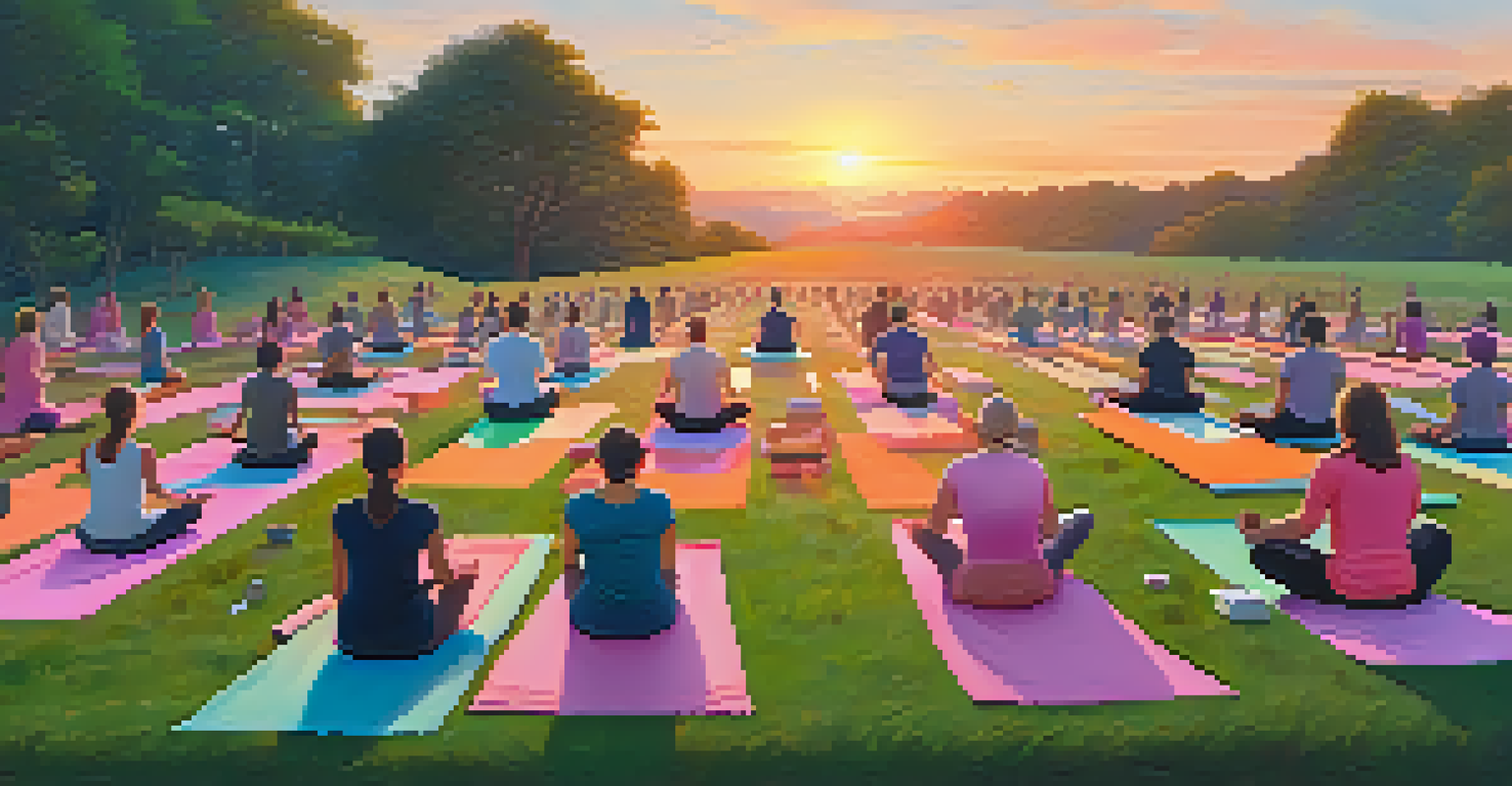Yoga Myths Debunked: Understanding Its True Benefits

Yoga is Only for Flexible People: A Common Misconception
Many people believe that yoga requires a certain level of flexibility, which can discourage beginners. However, yoga is about meeting yourself where you are, regardless of your current flexibility. There are various styles and modifications that cater to all body types and abilities, making yoga accessible to everyone.
Yoga is not about touching your toes, it’s what you learn on the way down.
Think of yoga as a journey rather than a destination; it’s about progress, not perfection. Each pose can be adjusted to fit your body, allowing you to work within your own limits and gradually improve. This means that even if you can’t touch your toes today, with practice, you might surprise yourself in the future!
So, if you’ve been hesitant to try yoga because you feel inflexible, remember that the only requirement is a willingness to learn and grow. Flexibility can develop over time, and yoga is the perfect practice to help you along the way.
Yoga is Just Stretching: Understanding Its Depth
While it’s true that yoga incorporates stretching, saying it’s just stretching is like saying a book is only made of pages. Yoga encompasses a holistic approach that includes physical postures, breath control, meditation, and mindfulness. This blend creates a unique practice that benefits both the body and the mind.

Each aspect of yoga works together to promote relaxation, reduce stress, and enhance overall well-being. For instance, breath control, known as pranayama, helps regulate your energy and can profoundly impact your mental clarity. This demonstrates that yoga is more than physical; it’s an integrated practice for body, mind, and spirit.
Yoga is for Everyone, Not Just Flexible
Yoga is accessible to all body types and abilities, emphasizing personal growth over perfection.
So, when you think of yoga, remember it’s not just about stretching; it’s a multifaceted practice that nurtures your entire being. Engaging in yoga can lead you to a deeper understanding of yourself and your connection to the world around you.
You Need to Be Fit to Start Yoga: A False Belief
Many people avoid yoga, thinking they must be fit before they start. This belief can create a cycle of avoidance that prevents individuals from experiencing the many benefits yoga has to offer. The truth is, yoga welcomes all levels of fitness, and it can actually help improve your physical condition over time.
The mind is everything. What you think you become.
Imagine yoga as a supportive friend rather than a demanding coach. It encourages you to listen to your body and progress at your own pace. Whether you’re a seasoned athlete or just beginning your fitness journey, yoga can adapt to your needs and help enhance your overall health.
Starting yoga does not require prior fitness experience; it’s about the commitment to show up and practice. Embracing this mindset can lead to transformative changes in your body and mind, instilling a sense of empowerment and confidence.
Yoga is Only About Physical Benefits: The Bigger Picture
While many people turn to yoga for its physical advantages, such as increased strength or flexibility, the practice offers much more than that. Yoga impacts mental health, emotional balance, and spiritual growth, making it a comprehensive wellness tool. It encourages self-awareness and personal development, which can lead to a more fulfilling life.
Consider yoga as a sanctuary where you can reconnect with yourself amidst the chaos of daily life. Through mindful practices, you learn to navigate stress better and cultivate a sense of calm. This emotional resilience can significantly enhance your quality of life, helping you respond to challenges with greater ease.
Yoga Offers More Than Just Stretching
It combines physical postures, breath control, and mindfulness to promote overall well-being.
In essence, yoga is not just about the poses; it’s about creating a harmonious relationship between your body and mind. By embracing this holistic approach, you unlock the potential for profound personal transformation.
Yoga is a Religion: Debunking the Misunderstanding
Some people mistakenly view yoga as a religion, leading to misconceptions about its practice. In reality, yoga is a philosophy and a discipline that can complement various spiritual beliefs without imposing any specific doctrine. It’s about personal experience and growth rather than adherence to a set of religious practices.
Think of yoga as a universal language that speaks to everyone, regardless of their background. The principles of yoga, such as mindfulness, compassion, and balance, can resonate with people from all walks of life. This inclusivity makes yoga a versatile practice that anyone can adopt without compromising their beliefs.
By understanding that yoga isn’t tied to a single religion, you open the door to exploring its benefits without hesitation. It becomes a personal journey of self-discovery and empowerment, tailored to your unique path.
Yoga is Only for Women: Challenging Stereotypes
The stereotype that yoga is primarily for women is not only outdated but also misleading. Men can benefit significantly from yoga, just as women do, and many male athletes have embraced it for its strength-building and injury-prevention qualities. The practice is open to everyone, and its benefits are universal.
Think of yoga as a tool for enhancing physical performance and mental focus, which can be particularly beneficial for men involved in sports or high-intensity activities. The strength and flexibility gained through yoga can translate into better performance and reduced risk of injury.
Yoga is Inclusive and Affordable
Practicing yoga doesn't require expensive classes; it can be done anywhere and often for free.
By breaking down these gender stereotypes, we encourage a more inclusive yoga community that welcomes everyone. Embracing yoga can lead to greater balance and strength for all individuals, regardless of gender.
Yoga is Expensive and Time-consuming: Finding Accessibility
Many people assume that practicing yoga requires a hefty investment in classes or equipment, leading to the belief that it’s out of reach. However, yoga can be practiced in various settings, including at home, in nature, or in community spaces, often at little to no cost. There are countless free online resources and apps that make yoga accessible for everyone.
Consider yoga as a practice that can fit into your lifestyle rather than a rigid commitment. Even just a few minutes each day can yield significant benefits, allowing you to integrate yoga into your routine without feeling overwhelmed. You don’t need to dedicate hours at a studio to experience its rewards.

By changing the narrative around accessibility, we can invite more people to enjoy the transformative power of yoga. Ultimately, it’s about finding what works for you and making the practice your own.